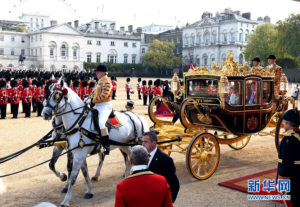At the end of a day of pageantry during Xi’s visit to the UK in mid-October, the lavish banquet at Buckingham Palace wrapped up with a rendition by the Countess of Wessex’s String Orchestra of ‘Nobody Does It Better’, the theme song from the The Spy Who Loved Me, a James Bond flick about two stolen nuclear submarines. The two countries had earlier announced that China would take a one-third stake in the £18 billion Hinkley Point C nuclear power plant project.
Former prime minister Cameron had been hailing the ‘golden era’ 黄金时代 in Sino-British relations ever since his 2015 re-election. British policy aims to secure London’s primacy in both international trading in the RMB and Chinese inward investment into Europe. But David Cameron and former chancellor George Osborne annoyed many of the UK’s traditional allies as well as domestic critics who believe Britain had abandoned universal values in favour of hard cash, despite there being no evidence that the UK’s human rights policy towards China had changed. Steve Hilton, David Cameron’s former advisor, called Xi’s visit ‘one of the worst national humiliations we’ve seen since we went cap in hand to the IMF [International Monetary Fund] in the 1970s’.
Chinese state media, meanwhile, joyously propagated images of Xi and his wife Peng Liyuan enjoying a traditional state visit. ‘No institution does pomp and pageantry quite as well as the British royals, and probably no institution appreciates it as much as the modern Communist Party of China,’ observed The Financial Times. Britain’s role in China’s ‘century of humiliation’ was overlooked in favour of the rhetoric of ‘win-win co-operation’ 共赢 and enthusiastic praise for British culture. Even the nationalistic Global Times, which in 2013 called Cameron’s overtures insincere and the UK nothing more than ‘an old country apt for travel and study’, railed against any suggestions that the ‘golden age’ was built on inequity. It characterised such a view as mere ‘sour grapes’.



